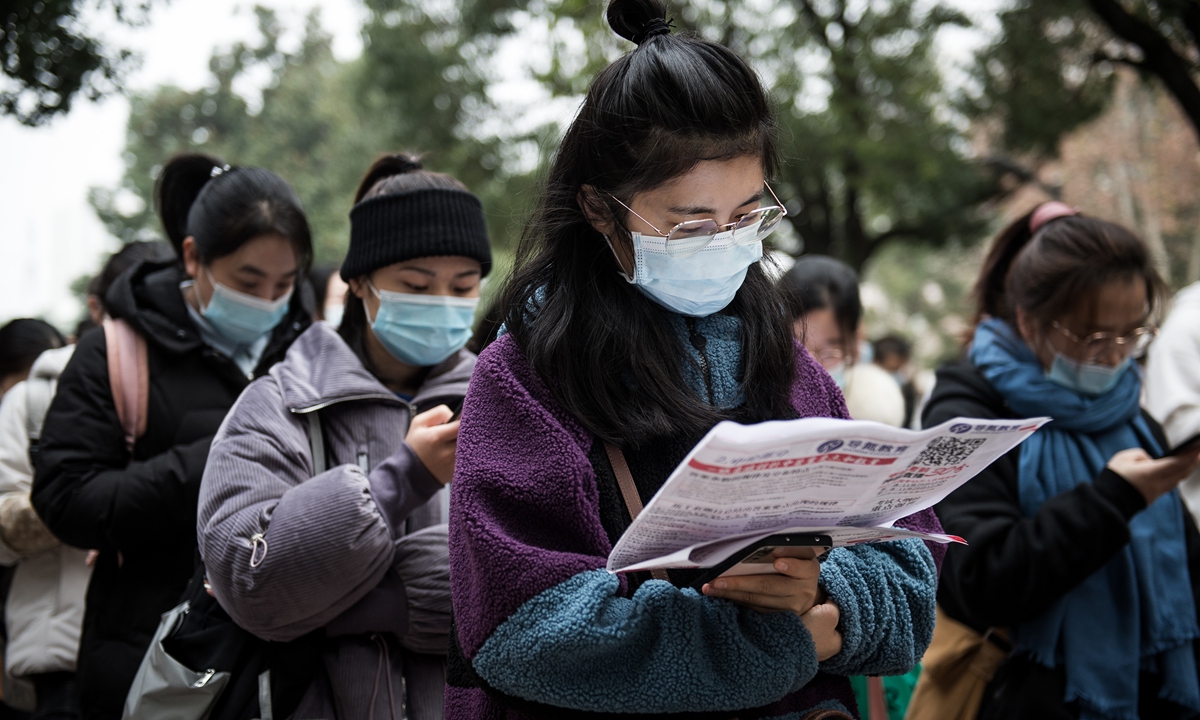HK, Macao youth vie for Shenzhen civil service posts
By Cui Fandi Source: Global Times Published: 2020/12/14 20:28:40

Hopefuls line up for the 2021 civil service exam at Huazhong University of Science and Technology in Wuhan, capital of Central China's Hubei Province on Sunday. China will recruit 25,700 civil servants to work for 79 central government agencies and 23 institutions directly under them in 2021. About 1.57 million are qualified to take the exam, making the competitive ratio 61:1. Photo:IC
As 446 graduates from Hong Kong and Macao compete for five civil service positions in Shenzhen, the Guangdong-Hong Kong-Macao Greater Bay Area kicked off another round of integration.
It is the first time that Hong Kong and Macao citizens have participated in Shenzhen's civil service recruitment tests, which took place on Saturday and Sunday. Five positions were offered exclusively to people from the two special administrative regions, China News Service reported on Sunday.
The application requirements for these positions are Hong Kong and Macao citizens with a bachelor's degree or higher who uphold the Constitution of China and support the leadership of the Communist Party of China and the socialist system.
More than 400 applicants applying for five posts far exceeded expectations, especially as Hong Kong and the mainland have not yet fully restored personnel transition under the COVID-19 epidemic, said Tang Fei, a Hong Kong-based member of the Chinese Association of Hong Kong and Macao Studies. "It proves that Hong Kong and Macao youth have great expectations for the mainland's job market."
Among the five positions up for grabs is a basic civil service position in the sub-district office of Fubao, Futian district, which is relatively near Hong Kong and is the most sought after, attracting 244 applicants.
The enthusiasm for this position reflects the SAR youth's lack of understanding of the job market and prospects in the mainland, so distance becomes an important factor, Tang noted.
"The youth in Hong Kong have always had a very conservative tendency in choosing their careers, which is different from their mainland counterparts," Tang said. "The most popular professions in Hong Kong have always been doctors and lawyers in the past decades."
Tang said the mainland job market has opened a window for Hong Kong and Macao youth. The deeper their understanding of the mainland, the broader their vision of future employment will be. In the future, Hong Kong and Macao youth could join more industries in the mainland.
"What the mainland offers to Hong Kong and Macao is not only jobs, but also an opportunity for refreshing their perception of employment, and integration into the mainland's development," Tang noted.
With work places located in the central parts of Shenzhen, the five positions are in the fields of administration, finance, city planning, foreign personnel management and medical supervision, which are tailored to the development of the Guangdong-Hong Kong-Macao Greater Bay Area, and the direction of cooperation between the three regions, China News Service reported.
To further integrate to the mainland, HKSAR Chief Executive Carrie Lam unveiled in November the Greater Bay Area Youth Employment Scheme to encourage mainland companies that do business in Hong Kong and the Greater Bay Area to hire college graduates from Hong Kong, which will provide 2,000 slots. Hundreds of them will have positions in innovation and technology, with generous subsidies from the SAR government.
During the year-long social turmoil in Hong Kong last year, a few mainland companies had concerns about hiring from the SAR. As Hong Kong recovers, the most important thing is to form a talent exchange, driven by government departments. It is expected that the mainland will greatly increase the number of jobs open to Hong Kong and Macao youth, so that the two SARs are further integrated into the overall development of the country, analysts noted.
Posted in: SOCIETY